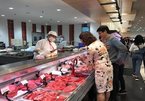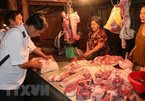 |
|
A woman buys pork in a wet market in Ha Noi. Although the recent pork shortage saw prices rise, domestic food supply is still plentiful with the increase of 760,000 tonnes compared to 2018.
|
Deputy Prime Minister and chairman of the National Steering Committee on Price Management Vuong Dinh Hue revealed the forecast at the Government’s end of year meeting in Ha Noi on Wednesday.
This year has seen inflation of 2.7-2.8 per cent, which ministries say contributed to stabilising the macro economy and supported economic growth.
According to Nguyen Bich Lam, director general of the General Statistics Office of Viet Nam (GSO), this was the lowest inflation rate in the past three years.
Lam said in 2018 it was 3.54 per cent and 3.53 per cent in 2017, adding that the low inflation helped economic growth reach 7 per cent this year.
The meeting’s participants said they thought the operating mechanism of the committee and the co-ordination of ministries and branches contributed to low inflation while transparency of information strengthened people's confidence in the Government’s price management.
According to Deputy Minister of Agriculture and Rural Development Phung Duc Tien, although the recent pork shortage saw prices rise, domestic food supply is still plentiful with the increase of 760,000 tonnes compared to 2018 helping make up the shortage.
Hue also told ministries to consider flexible management of exchange rates, market-based monetary policy and enhance co-ordination in coping with trade conflicts and geopolitical issues.
The Price Management Department (Ministry of Finance), the State Bank of Viet Nam and the GSO agreed the best scenario was for inflation to stay below 4 per cent.
Director of the Price Management Department Nguyen Anh Tuan predicted inflation would increase by more than 4 per cent in the first quarter of the year due to the pressure of rising prices from pork and other items for Tet.
MARD deputy minister Tien said some pig farms were avoiding selling products to increase prices, but he said from next month, there will be more pork from re-herds and imports to meet the demand.
Deputy PM Hue said: “Price management in 2020 will be more challenging than in 2019 but the committee will manage the inflation rate between 3.59 and 3.91 per cent.
“Although the pressure on inflation is still high in Q1, especially the pressure from pork prices, the committee will find it possible to keep inflation below 4 per cent.”
According to the Customs Office, Viet Nam imported 110,000 tonnes of pork in the first 11 months of this year, up 108 per cent in volume and 97 per cent in value from the year previous. — VNS

Minister warns firms of pork price hike
If pig farming firms continue to push pork prices up, they will suffer losses and damage as customers are forecast to use alternative meats and imported pork is likely to flood the local market until it dominates the pork market.

Agriculture ministry criticized for pork price upsurge
The Ministry of Agriculture and Rural Development’s leadership should evaluate and learn from its shortcomings and be held accountable for delays in reporting the potential shortage of pork and the pork price hike to the Government.
 Inflation for the next 12 months is expected to remain lower than 4 per cent, just like it has over the past three years.
Inflation for the next 12 months is expected to remain lower than 4 per cent, just like it has over the past three years.